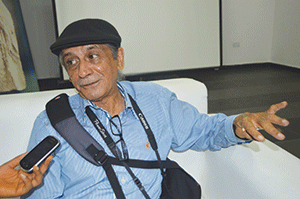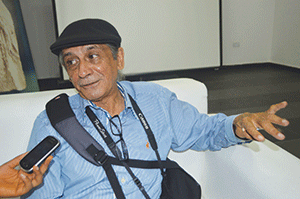Rashid Lombard, founder of the Cape Town International Jazz Festival, South Africa, was in Nigeria for the Lagos International Jazz Festival. The fluent speaker of Xhosa, Afrikaans and English, in this interview with Assistant Life Editor, TERH AGBEDEH, tells the compelling story of his journey from photojournalism to organising one of the biggest jazz festivals in the world.
Those who have followed the Cape Town International Jazz Festival will be completely inspired by what you have done with it. Right now, xenophobia is the biggest news out of South Africa and one wonders if the attacks in 2008 affected the festival?
I think, during the first outbreak, obviously, we were very sad about what was taking place, especially if you look at the history of the African National Congress (ANC), Pan African Congress and other liberation movements; the support we got from other countries in Africa. I know that for a fact because I worked for two and half years as a photo journalist and covered all the liberation movements, the NPLA, SWAPO, ANC, you name it.
So why is this happening? Of course there are a lot of reasons. Somehow, it didn’t affect that jazz festival at all. I think the reason is because art and culture play an important role in bringing people together, and it is an incredible and important platform to unite people. So we had, for example, Fela Kuti’s son, Femi; (as well as) Cesaria Evora, and that brought people together. It was amazing the kind of interaction and no talk about what was actually taking place in the country. So I think art and culture, heritage play a very important role in uniting people and cleansing of the mind. Governments should pay attention to using heritage and culture as a medium to communicate to people across the colour line.
You worked as a photojournalist and then you started the festival; how did that come about?
From a young age, I was always involved with music and musicians. But during my stint as a photojournalist, I covered mainly conflict in Africa, and music was always my healing therapy. After the 1994 elections, Nelson Mandela became the first black president, and I decided to stop working professionally as a photographer. It was when there was a democratic government and the first radio stations were given licence. I started Push Radio, a community station. After that, I started a classical and jazz radio station. It was a natural transition to look at jazz festivals. I had been travelling the world every June/July of the year just visiting North Sea, Norway, Sweden; that was when I realised we need a major festival of the same calibre as in Europe. And how can I start it without any money? It was just the passion and I having confidence. Imagine during the cultural boycott, a lot of artistes couldn’t come to South Africa; so there were all the jazz veterans and also Nostalgia, the Commodores, Roberta Flack, Cesaria Evora and so forth. That was how I approached the organiser of the North Sea Jazz Festival, and he said send me a fax. Three months later, I sent him a return ticket and hotel accommodation. That was how it all started. My philosophy is that the more festivals – even in the same country or town – that are successful, the better for the industry. This is because we deal with the cultural industry. It is an industry you can compare to mining; construction has a huge turn-over. And we must respect that because we are not just rock and rollers, you deal with tourism, service providers, with the image of the country, the city; it is huge.
I have been up down, people thought I was going to close; it was in the papers that the festival is insolvent, but I came back.
The Cape Town Jazz Festival has got a lot of sponsors; do you think there is something organisers are doing wrong with festivals in Nigeria that has not got them the kind of support you get?
We have just finished our 16th year. It was a struggle. The main thing was sponsorship. My first port of call was the national government and they came onboard. One area where government spends money is training, development and empowerment. So I went there immediately and organised workshops looking at different sectors. It is not only performance; there is a production side. You talk about job creation. From the corporate world, business is difficult; but I found ways to give them return on their investment through activation. It took me long – activation; will cell phone companies come onboard, interact with my audience? So it has been difficult, but I have a blueprint now that I can share.
Tourism came onboard and all of a sudden we have people come from all over Africa. So they invested not necessarily in me directly, but they would spend, advertise and bring journalists in. So it helps. It is not only cash; it is cash and kind. So it has taken me a long time; it is not easy, but I have a formula.
Is this blueprint you talk about a book you have written or you just do seminars?
It is in my head. It is a formula that can work anywhere; but it must be tried and tested. But I think the most important one is to get government onboard and show how you spend the money. You have got to be accountable. My report is very thick. (If) government (officials) want any invoice, I let them have it because it is public money; so the better you report back, the more you are going to get. I get nine million rand from the national government. So you are accountable; to the private sector as well. You must make a profit; how do you sustain it, how do you pay people? How do you invest in future events? Through the year, you should be having events, workshops.
You have done this for 16 years. When you started, you must have had expectations; would you say that you have met some of them?
You know, I have been overwhelmed, actually. I almost closed down the festival, and people came to help. I had to go to the financial world eventually. I try not to sell my soul, but I had to go close to it. First I had 100 per cent, then I got 25 per cent; but I had to give 51 per cent to a financial institution. It is the boardroom (thing) you have to go through. They don’t understand art and culture; they just look at the bottom line. But I needed that support.
I have been totally overwhelmed, first, by the public support. Without public support, you have got nothing. I started in the first year with 2,000 people, 3,000; but now I have 37,000 people over two days sold out. It has been selling out for the past four years; but it was blood, sweat and tears. Not easy. But I can short-circuit that now with that knowledge.
Now I have set up my business under my family name because I believe that I am a brand. I can work with other festivals; so I am a culture curator. Be it theatre, dance; I would look at the venue and say, ‘I already saw mistakes’. Music is about healing, but you can only heal the future if you understand the past, and young people need to know that.
Talking about healing; would you say there has been healing in South Africa?
Our biggest problem in South Africa is that we haven’t looked at healing. It is not good you have a good constitution and never talked about the healing process. People are angry and it hasn’t been looked at. What should be done, because as much as we can, everyone is marching and marching? Hang on, you are marching for two days and there is nothing. What is the cause? The nation is angry, starving. There is a process we should follow. We should be getting all our top researchers to do a scientific study on the cause of the anger. We have got to start down below and get all that information, which hasn’t been done. And I hope they are going to look at it now.
Wasn’t that the whole idea of reconciliation shortly after apartheid?
That worked in terms of families that lost loved ones. But they didn’t take it further. It is like a boiling pot with the lid on. These are just two per cent of the population. There are still issues, and I hope that now they will come to their senses and say ‘let’s do proper research, let’s have scientific reasons why this is happening’. Africans helped liberate South Africa and you can’t write it off.












